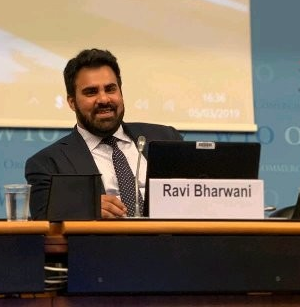Is it Gorgonzola Cheese? How Food Names Impact U.S. Trade
December 16, 2019
By Ravi Bharwani
The United States and countries in Europe have differing approaches to naming food products -– and that can have important trade consequences.
When you go shopping for Gorgonzola cheese at a supermarket in the United States, the product you buy will be fairly consistent from brand to brand because all food producers adhere to FDA regulations known as Standards of Identity or SOI. These standards establish the name of the food for labeling purposes and, describe the physical and chemical properties of the cheese, including minimal milkfat, type of mold, maximum moisture content and minimum aging, as well as optional ingredients like blue or green coloring. Standards also may describe the manufacturing process when that process has a bearing on the identity of the finished food.
FDA began establishing SOI’s shortly after the Federal Food, Drug, & Cosmetic Act was enacted in 1938 to promote honesty and fair dealing in the interest of consumers. Today there are more than 280 SOIs, largely for staple products. FDA’s SOIs are consistent with the Codex Alimentarius, a collection of internationally recognized standards, codes of practice, guidelines, and other recommendations relating to foods, food production, and food safety.
In Europe, many foodstuffs are defined by a concept known as geographical indications (GI). GI is defined as a “distinctive sign used to identity a product as originating in the territory of a particular country, region or locality where its quality, reputation or other characteristic is linked to its geographical origin." According to the EU, a GI “ensures fair competition for producers and provides consumers with reliable information on the place of production or specific characteristics of a product… it helps to preserve traditional, high-quality products and know-how, and jobs related to them... and is particularly important to small and medium-sized enterprises (SMEs).”
Gorgonzola cheese sold in the EU has a protected designation of origin, a type of GI that covers agricultural products and foodstuffs whose quality or characteristic is essentially or exclusively due to a particular geographic environment and is produced, processed, and prepared in a given geographical area using recognized know-how. This GI designation ensures that only products originating in the Lombardy and Piedmont regions in Italy are allowed to be identified as Gorgonzola. As of May 2016, there were 1,341 registrations for food and agriculture under the EU’s GI programs.
As a result of this approach, U.S. dairy farmers cannot sell their “Gorgonzola cheese” in Europe even though their product meets the FDA’s legal definition.
The E.U.’s GI approach is controversial. Many complain that the E.U. is using GIs as a trade barrier by imposing restrictions on the use of generic or common names for foods and thus limiting the ability for U.S. food producers to export their products.
Moreover, the EU has negotiated free trade agreements with major American trading partners, including Canada and South Korea, that provide full protection of the EU’s GIs. That means U.S. dairy farmers can’t sell their Gorgonzola or Cheddar cheese in those markets either.
But times may be changing.
On August 5, the U.S. Dairy Export Council, the Consorzio Tutela Mozzarella di Bufala Campana and the Consortium for Common Food Names signed an agreement establishing the free use of the generic term mozzarella.
In doing so, the parties also agreed to support more robust protection in the United States and around the world for a specific mozzarella product, Mozzarella di Bufala Campana as a Protected Designation of Origin, while also allowing for the United States to export mozzarella cheese that is generically labeled.
The three parties said they hoped the agreement will pave the way for a new dialogue on the protection of products of origin in the U.S. and in global markets, including those bearing GIs, while respecting the rights of companies to produce and market products bearing generic names.
Meanwhile, the U.S. is looking at possible revisions to its Standards of Identity, potentially eliminating standards that may not be necessary. But the priority is public health, maintaining the basic nature and nutritional integrity of products so they meet consumer's expectations, while allowing industry flexibility for innovation that could lead to more healthful foods.
Ravi Bharwani is a Policy Advisor in the Office of Global Policy and Strategy


